(Above) Since 2015, Athens’ red light district has seen an influx of immigration tied to the refugee crisis (Photo: Jenny Lower)
On a Thursday afternoon at The Salvation Army in Athens, Greece, Captain Rachele “Ray” Lamont is engaged in conversation with two young women who have been quietly waiting their turn in the hectic lobby.
A translator explains that the women are hoping for assistance. But The Salvation Army isn’t taking any new registrations here—the organization is almost out of supplies.
“We’re going to work something out,” Captain Lamont tells the translator. She turns to the young women: “To the best of my ability, I want to help you.”
They make arrangements for the women to come back the following Wednesday. At the end, Captain Lamont gives each woman a hug.
Captain Lamont, a Canadian Salvation Army officer, is the anti-trafficking co-ordinator for Greece. The pair from the lobby are women who are being sexually exploited through prostitution. Both are from Bangladesh and are supporting their children back home. Their families don’t know what they’re doing here in Greece.
“They thought that when they got here, it would be a better life,” Captain Lamont says. “They couldn’t find work. So this is where they are now.”
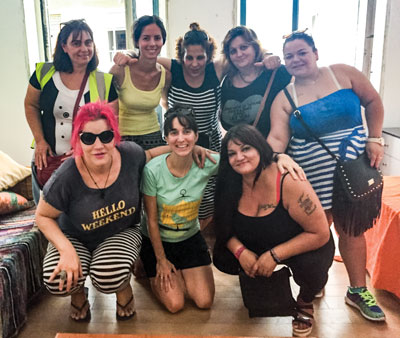 Cpt Ray Lamont (front, centre) with women who are receiving support through The Salvation Army’s Green Light Project
Cpt Ray Lamont (front, centre) with women who are receiving support through The Salvation Army’s Green Light Project
Though the business of prostitution has never been easy, it’s become more difficult since the Greek financial crisis. Almost 24 percent of Greeks are unemployed. Enforced austerity has slashed rates for sexual services, leaving many women struggling to survive.
The Salvation Army is one of a handful of faith-based organizations that minister to persons who are being sexually exploited and victims of sex trafficking in Athens’ toughest neighbourhoods. The Green Light Project, which launched in 2013, aims to build relationships and holistically support women in the red light district.
“Our goal is to transform souls and communities from a state of surviving to thriving,” Captain Lamont explains. The Green Light Project offers a safe, supportive and judgment-free environment for women and children who work and live in the red light district, with programming that aims to meet their physical, emotional, mental and spiritual needs.
“The biggest thing we are focusing on now is building credibility and trust,” Captain Lamont says. “We want to play a non-judgmental role in their lives, to say that we’re going to love you where you’re at.”
Brothel-based prostitution is legal in Greece but unregulated street walking is not. Registered prostitutes working out of licensed brothels must be over 18 years of age, unmarried, able to work legally in Greece, and are subjected to medical examinations each month.
“There are only 6,500 jobs in the brothels and an estimated 18,000 women, men and transgender persons in Athens who are being sexually exploited,” says Captain Lamont. “Many are forced to work illegally on the streets because there are not enough ‘jobs’ in the brothels.”
About 80 percent of the women Captain Lamont encounters are not from Greece. Many are from Albania, Bulgaria, Bangladesh, Romania, Ukraine and Russia. About one in five women are Greek, and most of these women are supporting dependents either in Athens or back home.
Sex trafficking is unfortunately too common. New faces often circulate into this neighbourhood for two or three weeks up to a few months before they’re moved again. This is done to elude the authorities, because a pimp has sold them, or they are simply sent to the next location on the circuit.
For the majority of the women on Satovriandou, “a life event connected to the economic or refugee crisis has taken them by surprise,” Captain Lamont says, “and then they find themselves here because of it.
“None of these women want to be sexually exploited,” she continues. “None of them ever thought that this would be their lives.”
The Only Way to Help
Less than a mile from The Salvation Army’s headquarters, a dramatic sculpture of a fallen angel dominates Karaiskaki Square in the Metaxourgiou neighbourhood. In the blocks surrounding the concrete plaza, approximately 80 legal and illegal brothels stay open for business around the clock. They’re easy to spot, distinguished even in daylight hours by an illuminated white LED light above the door.
Karaiskaki Square houses the headquarters of Nea Zoi, “New Life,” a Greek evangelical organization that since 1996 has journeyed into Athens’ brothels to build relationships with the women there. President Martha Polyraki oversees the organization’s weekly walks through the neighbourhood. She guides a visitor through one now.
In Metaxourgiou, pimps and traffickers keep a close eye on their wares. Turning a corner reveals a drug encampment, where addicts inject each other with heroin.
The johns entering and exiting the brothels run the gamut of age, ethnicity and affluence. One man whom Polyraki says is Greek looks to be in his 50s or 60s, with stringy red hair pulled into a ponytail. Some appear to be middle-aged businessmen: there’s one with a black laptop bag and another who drives off in a navy BMW.
Others appear younger and foreign-born, perhaps migrants themselves. One man in his early 20s pops into a doorway before emerging moments later, crossing the street and entering another establishment. Thirty seconds later he leaves again and heads down the street, only to turn up outside another business a few blocks later. Since the economic crisis, many patrons shop around for the best price.
In most of these brothels, one girl works a roughly eight-hour shift supervised by a madam. The prostituted woman may be controlled by a pimp, a trafficker or a “lover boy”—a term Polyraki uses to describe men who lure women into romantic relationships and then convince them to turn to prostitution. Often, the women start out exchanging sex for drugs but eventually get swept up working for someone else.
Several times a week, Nea Zoi volunteers venture in pairs into brothels. Kali Long, 25, worked with the organization from 2012 to 2014 while serving as a missionary with the Free Methodist Church. She says the typical Athens establishment is far from luxurious.
“It reeks. It’s dark. It has a funky feel about it. It’s filthy,” she says. “A lot of girls who work the morning shift, they don’t see daylight.”
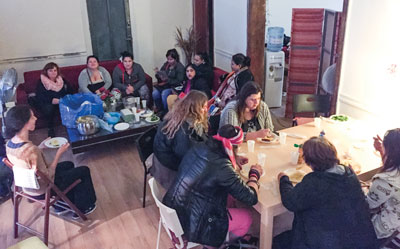 Women gather for a meal at the Green Light Project
Women gather for a meal at the Green Light Project
“I remember feeling like I could have met this girl walking down the street,” she says. “Maybe speaking about her daughter was a way of saying, ‘This isn’t really me who you’re seeing. This is the best part of me here in this picture.’ ”
As with The Salvation Army, Nea Zoi focuses on building relationships. Women can come by their offices for counselling, medical services or simply a safe space. Their staff doles out hugs.
“Jesus came to everybody. The only way you can help them is by giving them Christ,” Polyraki says.
She sees Nea Zoi’s outreach as an extension of Jesus’ saving mission. “I become his instrument—his hands, his heart,” she says.
Freedom Through Faith
For many women, the lack of job skills traps them in the cycle of prostitution. Threads of Hope was started in 2014 by Cecilia Sakatira, a Zimbabwean volunteer with Nea Zoi who wanted to extend the organization’s mission through practical channels.
The organization trains women on the cusp of leaving sex work in the trade of sewing. The non-profit sells purses, tote bags and other textiles through its online store. Many women had never seen a sewing machine until they came here.
They undergo a three- to six-month training period, during which they’re often still prostituted. Once that period is complete, they can apply for a place in the Threads of Hope workshop. The part-time position pays only minimum wage, but it’s dignified work that offers a chance at healing, Sakatira says.
She currently has five women working in the program. She hopes to move to a bigger space that will allow her to accommodate up to 10 women.
“As a Christian, it’s my responsibility to help as I have been helped to discover who I am and who God created me to be,” Sakatira says. “These women need help to rediscover their hope, their dreams, their identity and their value.”
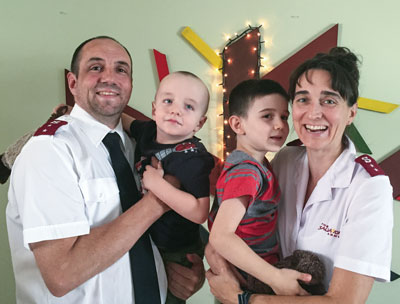 Cpt Ray Lamont (right) serves in Athens with her husband, Cpt Jean-Curtis Plante, regional business and administration officer, and their sons Micaiah and Josiah
Cpt Ray Lamont (right) serves in Athens with her husband, Cpt Jean-Curtis Plante, regional business and administration officer, and their sons Micaiah and Josiah
Though Captain Lamont struggles to find the time and resources to build the program she wants, her firm commitment to the work keeps her going. Because of past experiences, Captain Lamont says she can understand the mentality that leads women who are being sexually exploited to feel trapped. “Most of these women have been told that there is nothing better than this for them, and they believe it,” she says. “This leads them to despair and to wonder how they will ever get out.”
Captain Lamont and the Green Light Project aim to show these women that it is possible to get out—there is hope.
Reprinted from Caring (Fall 2017), with additional reporting by Kristin Ostensen.




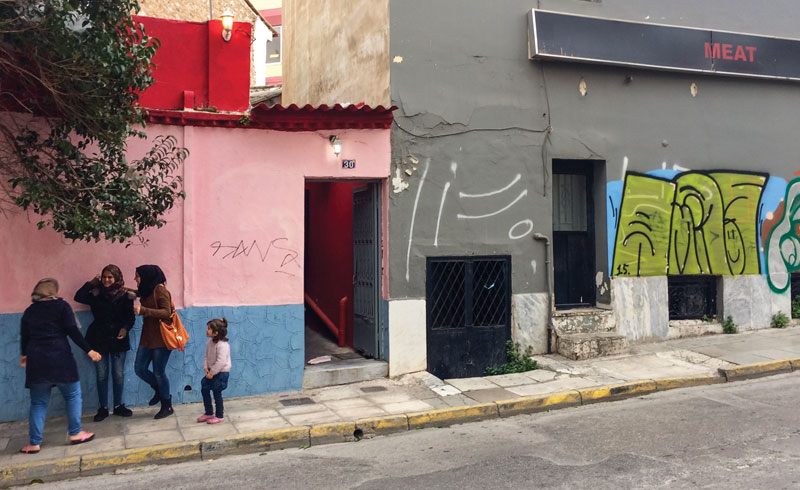
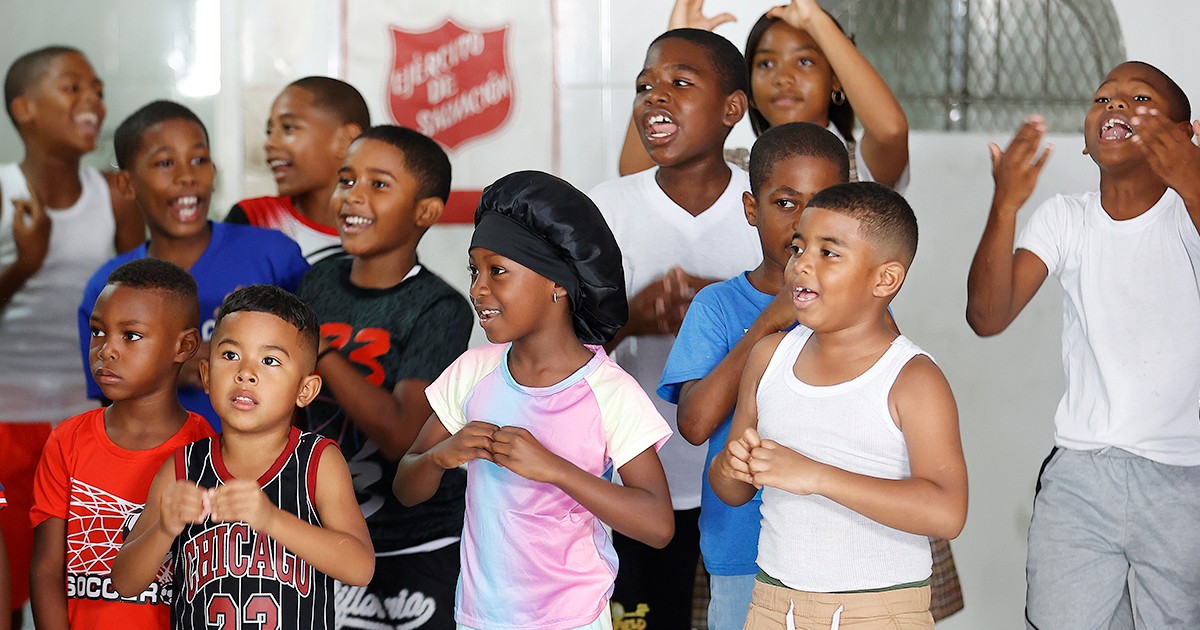




Leave a Comment